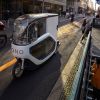"The smartphone is the key"
What does the mobility of the future look like? In what is Germany a global pioneer? The mobility researcher Andreas Knie has the answers.

Andreas Knie is Professor of Sociology at the Technical University (TU) Berlin. Among other things, he researches transport policy. He also heads the research group "Digital Mobility and Social Differentiation" at the Social Science Research Centre Berlin. We asked him about what the future of mobility looks like.
Professor Knie, what would the perfect city look like in terms of mobility and climate protection?
In the perfect city, we would no longer travel in combustion vehicles but rather in battery-electric vehicles powered by renewable energies. Bicycles and other means of transport that are not combustion engines would also be used. We would then no longer own vehicles, but only use them and share them with others.

What is the most important step towards this vision?
First, parking space must become more expensive and scarcer. Then there should be no public parking spaces at all.
What role will autonomous driving play in future?
The "robotaxi", the self-driving taxi, is the future. Germany is the global pioneer in this field. The law on autonomous driving has made use of such vehicles possible; now the service just has to be offered.
How would someone move through the city in future?
A user could take a bike near her flat in the morning via bike sharing. She rides it to the underground. Then she uses a rental scooter. The smartphone is the key. She doesn't have to buy a ticket. On her smartphone she can see where which means of transport is available. It notes how long the routes are and calculates the costs.
What German cities have made a good start in this?
In Tübingen, residents pay higher parking fees than elsewhere and even more for vehicles over a certain weight. Within its urban railway ring, Berlin has a comprehensive local transport system unlike any other in the world. It can take you to every corner by bus, train and ferry. In Hamburg, there are technical innovations that allow on-demand transport. In Freiburg and Münster, attempts are being made to establish bicycles as the main means of transport.
You would like to receive regular information about Germany? Subscribe here:


